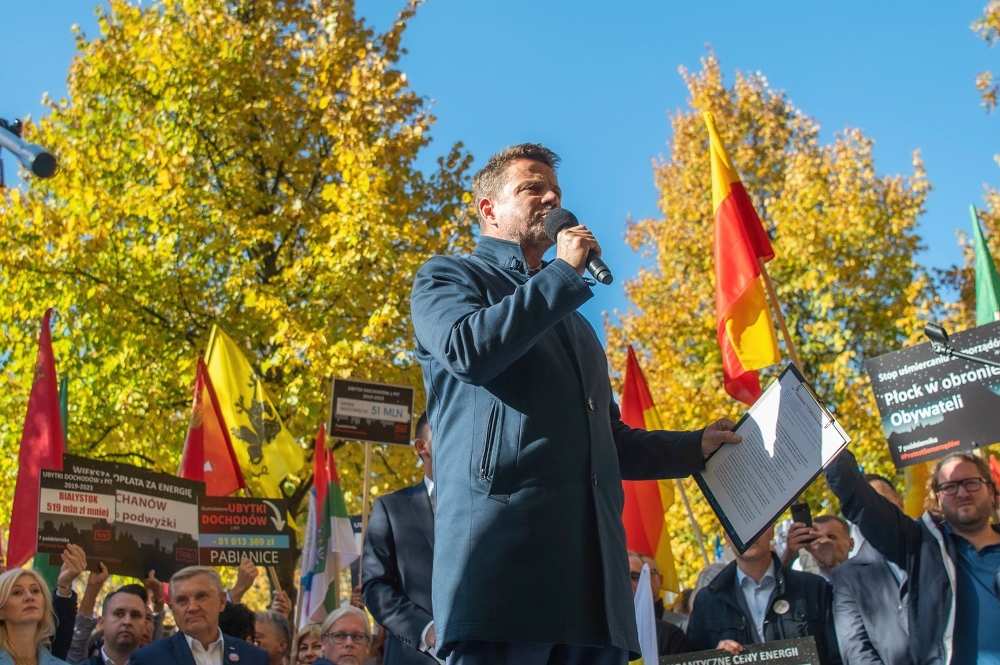Poland’s ruling conservative Law and Justice party (PiS) is facing protests and outright hostility from large city authorities controlled by the liberal Civic Platform (PO), even as the country suffers from a national energy crisis.
A demonstration was held in Warsaw on Friday involving mayors from some of Poland’s larger cities who protested against energy price increases and what they perceive to be the government’s attempts to make them responsible for the transport and distribution of coal.
In an interview with Catholic daily Nasz Dziennik, Sobieski Institute’s political scientist Andrzej Maciejewski said that this is a typical example of hostility towards the ruling government led by PiS, which is derived from the fact that PiS has not, unlike their liberal predecessors, been willing to prioritize spending on metropolitan areas over the rest of the country.
[pp id=46930]
Maciejewski said that the big cities are used to having things go their way and now resent the fact that other parts of the country are getting a better deal from the government.
When the opposition argues that the ruling PiS is hostile to local governments and opposes their existence, what they really mean is that PiS is refusing to make big cities the priority, he said. He further argued that “it is interesting that the representatives of the smaller local governments often take a different view from the (left-wing) opposition at meetings with the )ruling conservative) government.”
The analyst indicated that this rhetoric from the liberal Civic Platform (PO) underpins the “lie” that there is a divide between the federal and local governments. “In reality, we don’t have separate states run by local governments and the central government. We have one state, the state of Poland,” said Maciejewski.
The think tank analyst also says that it is totally false to see the ruling party as being against local government or big cities — rather it is a federal government that realizes local governments cannot cope with all challenges and competencies as a result of their financial limitations caused by indebtedness and an uneven tax base. It is actually helpful to local governments and cities when the central government steps in and copes with certain areas when needed.
[pp id=48737]
Maciejewski said he feels that opposition politicians are treating local governments ideologically rather than practically. They also attempt to use all crises, such as the pandemic or the energy crisis, as an assault on local autonomy.
The Sobieski Institute analyst does not think it is unreasonable for the central government now to be calling on local governments to help in a spirit of partnership with transporting and distributing coal.
“Given the huge pressure related to the war and the transport of grain from Ukraine, it should be all hands on deck, as it was with the refugee crisis,” he says.
Maciejewski also noted how politicians from larger cities were the first to call on the government to stop importing coal from Russia that they themselves used. The government agreed and this has created the coal shortfall Poland is now experiencing.
The difference is now that big cities are much less willing to help out. Often, it is the very same politicians who actually called for the closure of coal mines in Poland and supported all the EU’s green policies — the same policies that have contributed to the energy price increases in Poland. Instead of confronting the federal government, city leaders should engage in dialogue with it, concluded Maciejewski.
The price of coal has risen sharply over the last few months and there have been supply problems for the country’s 3 million domestic users. The government has attempted to meet the shortfall with imports, but there are problems with sorting and distribution. The situation is not helped by wrangling within the government as to who should have ordered more coal and how quickly, nor by the conflict between central governments and the local cities. Coal has now become the proverbial hot potato no one wants to touch.





